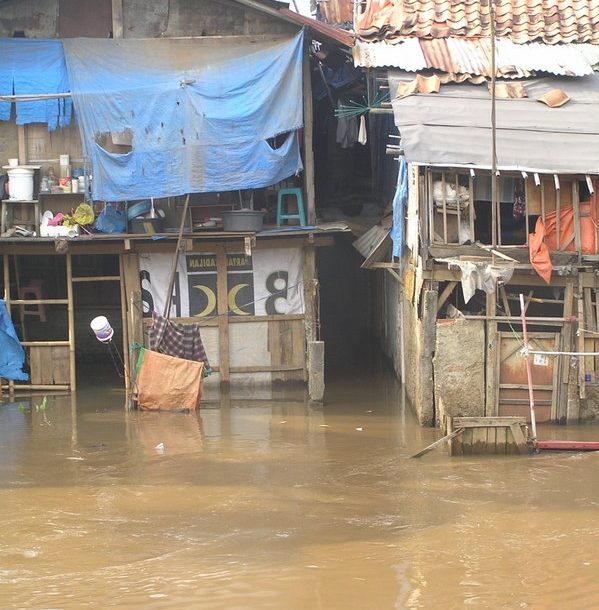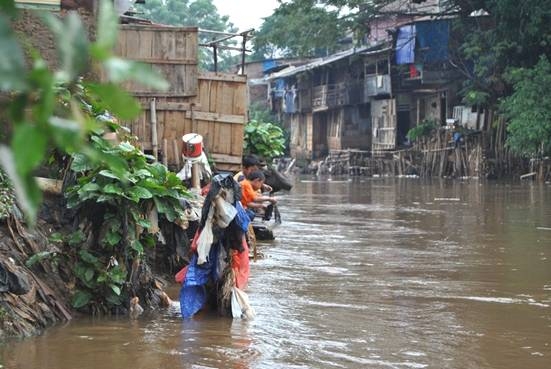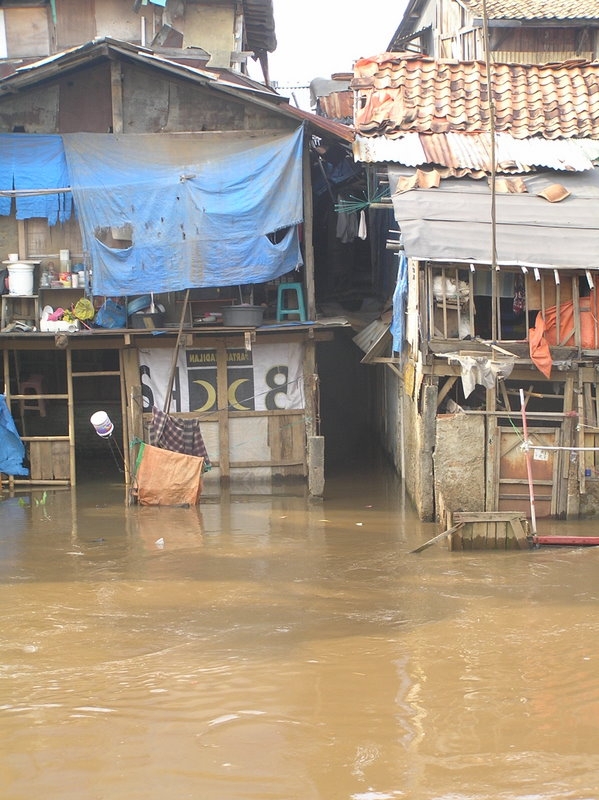
In Jakarta’s politically-hardened, waterlogged slums, Jokowi is an exciting new figure of hope. Photo by author.
From 2010, I conducted 12 months of anthropological fieldwork in one of Jakarta’s poorest neighbourhoods, located alongside the banks of a branch of the Ciliwung River, the largest river in Jakarta.
I was able to rent a small room in the house of one of the inhabitants, from which I studied people’s responses to floods – the topic of my research project – and from which I slowly and gradually became familiar with my temporary neighbours’ daily lives.
I was invited to their birthday parties and weddings; I participated in communal prayers; I joined them to the market and to work; I babysat their children; in the evenings I chitchatted and gossiped with them on my doorstep; in the mornings I stood with them in line to buy bubur (porridge).
During all these activities, I asked my respondents hundreds of questions and they, tirelessly, explained to me their views on poverty, on floods, and on politics.
Once back behind my Amsterdam desk, analysing my data and writing up my findings in a dissertation, it frequently occurred to me that I knew more about these respondents than about some of my own friends in the Netherlands.
For each respondent, I had collected about 30 pages of typed interview quotes, combined with an additional 10 pages or so full of observations and personal reflections in a fieldwork notebook.
So, when I recently started a small research project about the upcoming Presidential elections, I believed, arrogantly, naively, that I could more or less predict how my respondents would feel about them.
After all, we had often discussed political issues during my fieldwork and from those discussions I learned that politics were the least of their concerns.
Either they were downright sceptical about the intentions of politicians; or they acted indifferent : ‘The Indonesian government does not care for poor people like us’, they would typically tell me, ‘so why would we care about them?’
I could not imagine that my informants’ political views would have radically changed within three years. But when they answered my questions on Facebook and by email (even in Jakarta’s slums, many people – especially the youngsters – spend loads of time online!), I had to read them twice to finally conclude that I had been all wrong. I had completely mispredicted the political views of my former neighbours.
So what kind of replies did I expect, and what did I receive instead that was so puzzling? Let me start by clarifying in more detail what my own expectations were; and for this, it is needed to describe the situation in which my respondents live, and how that underlies their generally negative attitude towards politics.
Jakarta’s poorest have a persistent distrust of their government. This distrust is generated by the years of disadvantage and discrimination that slum dwellers experience at the hands of their political institutions.
For example, the kampung in which my respondents live is extremely flood-prone: several times a year, people’s houses are inundated by contaminated river water, damaging their values and making them ill.
The government offers no social safety net to support flood-victims. The residents have no personal insurance to help them recover from floods; neither can they afford it to save large sums of money as a buffer that could be used in times of disaster .
Most of them earn under 50.000 rp per week (less than 5 Australian dollars) by selling snacks or rice meals on the local market or the streets surrounding the kampong. This is an income just about enough to pay for the rent, feed one’s family and pay for the school uniforms of the children. That is – just about enough now. There is, however, a fair chance that their financial situation will soon worsen, due to planned evictions of the neighbourhood.
As part of an enormous flood-prevention program, the Jakarta administration plans to deepen and widen the Ciliwung River and clear its banks of settlements. 70,000 slum dwellers will therefore be evicted over the coming years.
These people will be displaced or forcibly resettled, including the large majority – if not all – informants of my study. At the time of writing this article, evictions had already been carried out in the north of Jakarta, where the ‘illegal’ houses of hundreds of families were demolished because obstruct the site of the dam.
As these and future evictees do not enjoy the right of legal access to housing, it is expected that they will not be compensated after the kampung has been cleared.
For some of my informants, this would be yet another house they would lose: one woman came to this settlement only after she had been evicted from nine other ‘illegal’ slums.
The political distrust that results from this marginalization is reflected in the narratives of respondents. Most of them do not vote. They have lost their faith in politicians: ‘in fact, politicians cause us more problems than we already have’.
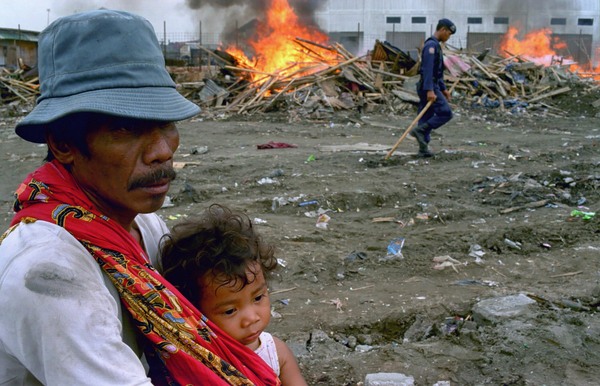
For Jakarta’s administrators, evictions have long been an acceptable method of urban management. As Governor, overseeing the flood-management program, Jokowi has promised ‘relocation’ not eviction. Photo by Arie Basuki
With such skepticism fresh in my mind, I recently sent a list of questions about the elections to twenty of my respondents. Were they planning to vote this time, and if so, for whom, and why?
I was especially curious to know how my respondents felt about Jokowi, the candidate behind the Jakarta administration’s flood-management program and paradoxically, the most praised for his pro-poor attitude. I expected my respondents to be as distrustful about him as they had always been about other politicians, if not more; yet I found this time, something had changed.
Take Abdul (27) and Muhammad (35), whom I knew to be severe criticasters of the government. More than once, Abdul told me during fieldwork that ‘all politicians do is lie; never believe a thing that any politician says’.
Similarly, Muhammad once warned me never to interview a politician: ‘whether he works in the city government or whether he is the President himself; not one true word will come out of his mouth’.
Now, however, this same Muhammad states on his Facebook wall that ‘people from every corner of Indonesia want Jokowi to become president because Jokowi is our hope towards a new Indonesia’. Abdul adds in a chat message to me that he is ‘very sympathetic towards Jokowi because he brings hope for Indonesian people, he will bring equity in justice and prosperity for all’.
And then there is Yati (19), who once burst into tears talking about the upcoming eviction, screaming that ‘the politicians of Indonesia mistreat us. I think they are all bastards!’ But not Jokowi, she makes clear to me in an email: ‘I personally think Mr.Jokowi is kind, wise, and cares for the poor.’
Flabbergasted about this unexpected change in their political views, I asked my respondents why Jokowi was different than other politicians. Did they truly believe that he would be able to improve life in the neighbourhood, had he perhaps promised them that he would call off the planned eviction?
The answers I received indicated that I still had to learn a lot about Indonesian politics. Of course he made promises, they wrote to me: he once visited the neighbourhood as part of his political campaign and spoke to the inhabitants through a microphone, announcing that he would try his best to save the kampong from evictions.
He won’t stick to these promises, added my respondents hastily, and that, they said, is not the point. ‘The eviction will still be carried out’, wrote Yati, ‘because Jokowi is a politician and politicians do such things all the time’. And Abdul explained to me that ‘even though he has good intentions, he will still cooperate with other politicians, so eventually he cannot do what he promises’.
Clearly, it is not the validity of his promises that makes Jokowi so popular in my neighbourhood. The only thing that sets him aside from all his predecessors, is that he visited the neighbourhood. Unlike other politicians, he took the time to speak to slum dwellers’.
He even shook our hands’, wrote Muhammad to me. ‘He looked at people, and you could see from his eyes that he actually felt for us’, wrote another respondent. Talking with the most vulnerable in society; shaking their hands; listening to their stories and sympathizing with them – that may to outsiders (such as myself) not seem grand deeds for a politician that will probably soon order the slum to be evicted – but for my respondents, it symbolized an enormous change in the political climate. From being completely neglected, they are now seen and recognized – at least as part of a potential voter’s bank. Distrust may be persistent, but hope can rise surprisingly easily.
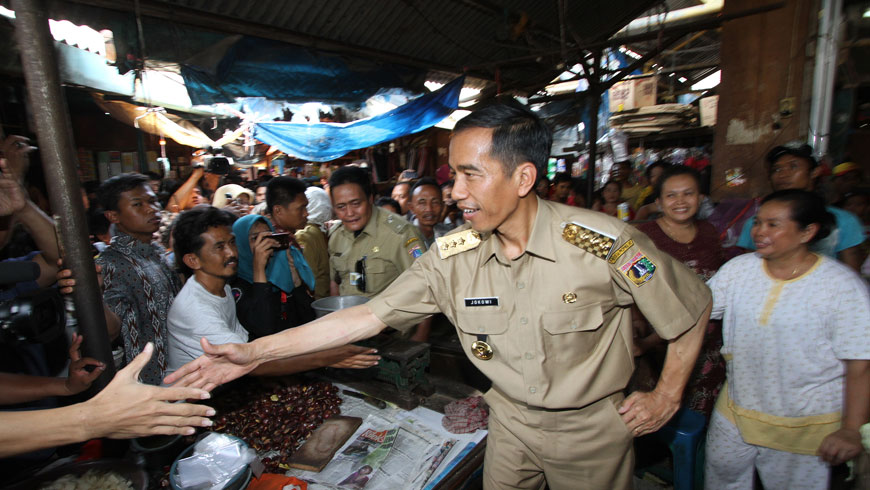
‘He even shook our hands’. River dwellers find enormous dignity in
their political courtship. Photo by lipsus.kontan.co.id.
The popularity of Jokowi begs the question: what explains PDI-Ps underperformance in the legislative elections? Pundits have argued variously that local PDI-P candidates didn’t make enough of Jokowi’s candidacy or that voters didn’t understand the distinction between the presidential and legislative elections. Some have even argued that Jokowi’s popularity is overblown.
None of this kind of speculation rang true for this community. Jakarta’s river-dwellers well understood the dual nature of the elections and PDI-P’s pre-campaign nomination of Jokowi as their presidential candidate. Indeed, some voters did vote for their local PDI-P candidate precisely because of the party’s affiliation with Jokowi. And others voted for other parties entirely. But half of the sample size abstained. If the residents of the slum so love Jokowi, then why not exercise their voting power and set him on the path to power?
The failure to vote in the legislative elections was not due to apathy or ignorance. My informants believe that Jokowi is indeed the best candidate to become Indonesia’s new President. But residents wanted to protect Jokowi from the brutalities of national politics. Abdul, for example, explains to me that he is worried that Jokowi’s ‘kindness will be exploited by his political rivals’ as soon as he would become President. ‘He is not very assertive, you know. Other politicians will probably overrule him if he has to cooperate with them’.
Muhammad writes in a Facebook message that even though Jokowi may have good intentions regarding poor people, his political colleagues will certainly not: ‘He is different than other politicians, also those in PDI-P. They do not care what will happen to us [people on the riverbank]. Only Jokowi cares – but what can he do, all by himself?’
They argue it would be much better if Jokowi would just remain Jakarta’s governor. In that way, he remains closer to the river people, and protected from the influence of untrustworthy politicians who might compel their eviction.
Or, as Yati writes: ‘if we compare Jokowi to other president candidates at this moment, it seems that Jokowi is the best. But if Jokowi becomes President, definitely Basuki (Ahok) will become the Governor of DKI. He does not care for us, and he does not even want to talk to us. If this would happen, I am afraid for the future of me and my neighbours.’
Roanne Van Voorst is a lecturer in Social and Cultural Anthropology at the University of Amsterdam.
 Facebook
Facebook  Twitter
Twitter  Soundcloud
Soundcloud  Youtube
Youtube  Rss
Rss 